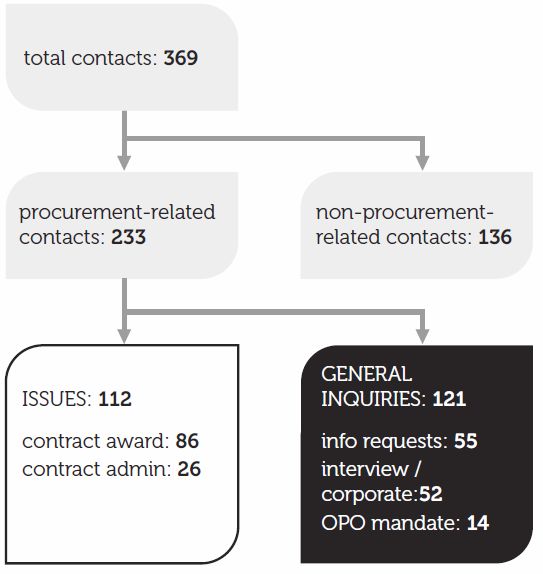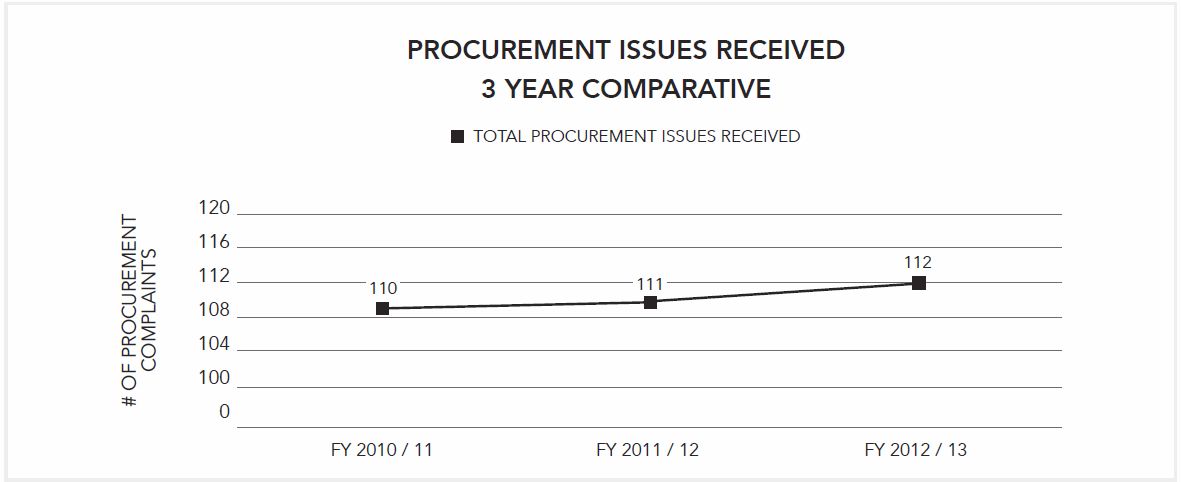Educate
One of the Office's primary objectives is to raise awareness and exchange information with procurement stakeholders who contact us. This is the basis for our Educate pillar.
In keeping with the Standards of Practice of the International Ombudsman Association which states … [t]he Ombudsman functions on an informal basis…engaging in informal third- party intervention,
our approach is to, first and foremost, provide information in a prompt and personalized manner.
Accordingly, of the 233 procurement-related contacts, 121 (52%) were cases where providing procurement-related information or responding to procurement-related questions was sufficient.
The remaining 112 (48%) involved cases of suppliers raising, or wanting to discuss, procurement issues. Experience has demonstrated that when dealing with these suppliers, few are contacting us with the specific intent of filing a complaint. Most are exasperated and simply want information or an explanation from an impartial, neutral third party.

Diagram 3

Text Version
This diagram illustrates a three year comparative in the number of procurement issues received by the Office of the Procurement Ombudsman. The three years are illustrated from left (2010-11) to right (2012-13). In the 2010-11 fiscal year, there were 110 procurement issues; in 2011-12, there were 111 procurement issues; and in 2012-13 there were 112 procurement issues.Diagram 3 illustrates that the number of these types of contacts has remained stable for the past three years.
The breakdown of the 112 issues has also remained relatively stable with 86 issues (77%) related to contract award and 26 issues (23%) related to contract administration.
Diagram 4
| Top Procurement-Related Issues | 2010-11 | 2011-12 | 2012-2013Footnote 1 |
|---|---|---|---|
| Evaluation and Selection Plan (e.g. restrictive criteria or biased ratings method) |
29 | 32 | 28 |
| Evaluation of Bids (e.g. unfair evaluation process) |
33 | 22 | 28 |
| Procurement Strategy (e.g. often non-competitive) |
19 | 27 | 26 |
| Statement of Work or Specification (e.g. unclear or unbiased) |
13 | 24 | 13 |
| Contract Execution (e.g. altering the contract) |
16 | 14 | 13 |
| Payment (e.g. late payments) |
10 | 6 (not in top 6) | 13 |
Diagram 4 illustrates the most common issues brought forward by suppliers. This list is consistent with the previous year, with five of the six issues remaining the same. The one exception is an increase in the number of suppliers complaining of delays in receiving payment from departments, resulting in the return of "Payment" among the top issues.
Coast to Coast Conversations
The other component of the Educate pillar relates to the Office's outreach activities. Consistent with our goal of implementing a more robust outreach program geared to engaging a broader spectrum of our clients and stakeholders, we participated in twice as many events as in the previous year. As federal procurement is not limited to the National Capital Region, neither are our services or outreach activities. Sharing and gathering information by attending stakeholder events across the country is a fundamental part of the Office's outreach approach. Among these events were meetings with chambers of commerce and boards of trade from Moncton to Vancouver, with Members of Parliament and their staff, and with federal procurement specialists and program managers, as well as participation in major conferences, including the Canadian Public Procurement Council (CPPC) National Forum and the Canadian Institute for Procurement and Materiel Management (CIPMM) National Workshop. These events and meetings were geared to inform Canadian businesses, business associations, chambers of commerce, boards of trade, parliamentarians, and federal procurement specialists and program managers of the Office's services as well as to solicit feedback on the procurement system and procurement issues.
Things To Make You Scratch Your Head…
How exactly does a company drive heavy equipment?
In response to a contract opportunity which included a requirement for a certification to drive heavy equipment, the supplier's bid was deemed non- responsive because the certification they provided was in an individual's name and not the company's name.
These meetings and events have not only allowed for the exchange of information, but have assisted us in building relationships and enhanced our understanding of stakeholder issues and concerns. Some highlights of the type of issues raised with us include:
Suppliers
- Concerned about bids being deemed non-compliant for what they viewed as insignificant administrative shortcomings.
- Frustrated by departments that were unwilling to participate in a debriefing meeting to discuss the shortcomings of the supplier's unsuccessful bid after the award of a contract.
- Spoke of situations in which they cannot bid on a federal contract without the necessary security clearance yet cannot be sponsored by a department because they do not have a federal contract or a reasonable prospect of winning a contract.
- Suggested they were challenged by the complexity, lack of timeliness, and absence of standardization of the federal procurement system as well as the lack of communication. Many did not know who to speak to or where to find information.
- Have a perception that contracts had been awarded to non-responsive bidders or bidders who had overstated or fabricated qualifications in their bids. Some questioned whether there were consequences to providing false information as it did not appear that information such as qualifications was adequately verified by departments.
Federal Officials
- Concerned that procurement training was not targeting those other than procurement specialists, such as program managers and others who are also involved in the procurement process.
- Advocated for the integration of procurement, including requirements and
timelines, into departmental and business planning cycles to prevent delays and minimize risks. - Suggested there is a lack of awareness of the complexity of procurement and the many policy and procedural requirements, which take time to meet when putting a contract
in place. Examples were given of program representatives arriving at the contracting unit at the "last minute" and expecting procurement specialists to "just put a contract in place."
We also heard from departments about some good practices they are implementing to address some of these issues. Examples include:
- procurement training for program managers and senior officials (lunch hour course, one- on-one or online self-learning tools);
- the development of internal service standards for procurement groups;
- the development of standardized statements of work and bid evaluation criteria for common purchases; and
- the identification of typical timelines for different types of procurement.
Beyond our Borders
The concept of a Procurement Ombudsman appears to be attracting international interest as is evidenced by invitations for the Ombudsman to present to foreign governments:
- We hosted two Chinese government delegations interested in learning about Office of the Procurement Ombudsman (OPO)'s mandate, services and role in federal procurement.
- The Ombudsman accepted an invitation from Ambassador Allan Culham, Permanent Representative of Canada to the Organization of American States (OAS) in Washington, DC, to speak to OAS representatives at a seminar on effective public management, including best practices in procurement.
- The Ombudsman accepted an invitation from the Institute for Competition and Procurement Studies at Bangor University, Wales, United Kingdom, to speak at an annual "Procurement Week" event hosted by the Institute. The event was attended by delegates from countries across the European Union working in procurement. The Institute subsequently offered the Procurement Ombudsman an executive fellowship with its Academy of Procurement Professionals.
Each of these events provided an opportunity to network with foreign procurement specialists, learn about international procurement trends and innovation, and share information on Canada's approach to federal procurement, including OPO's role in promoting fairness, openness and transparency.
Footnotes
- Footnote 1
-
The number of "top-procurement-related issues" for 2012-2013 totals 121, which differs from the 112 issues-related contacts. This discrepancy is due to the fact that multiple procurement issues are often identified through a single contact.
- Date modified: